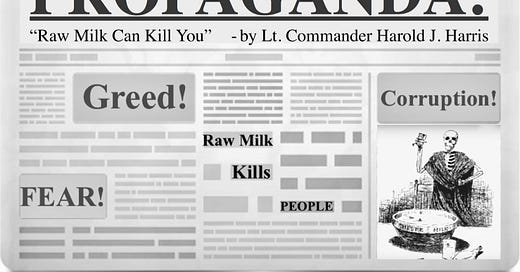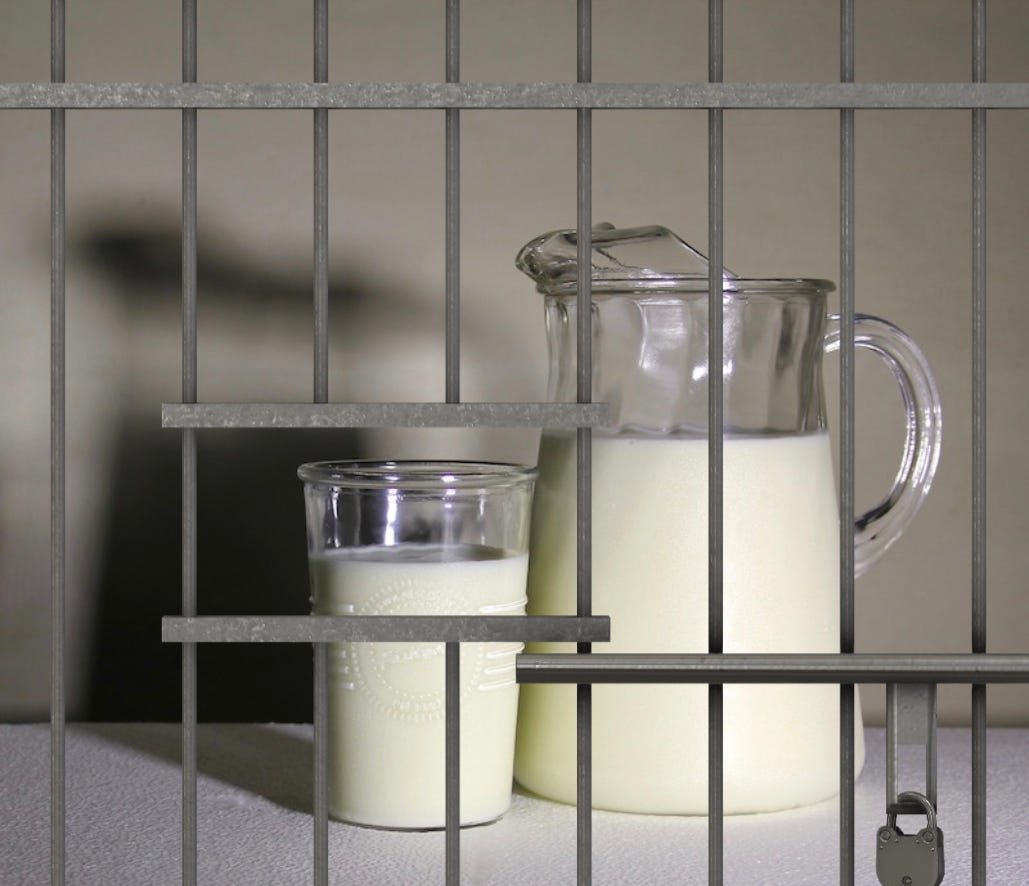How Raw Milk Changed Your Children’s Food Security -- Part 3
This 4-part article explores how the 1987 ban came about and what it means to your food security today
A “scientific” ideology banned raw milk and vilified mothers who chose it anyway. Behind this, was a wealthy philanthropist pushing his agenda and setting the stage for the demise of the small farmer and food security in America.
(Read part 1 here) (Read part 2 here)
The Rise of Propaganda
Journalist Edward Bernays published his book Propaganda in 1928. Bernays was not an ordinary journalist. He was Sigmund Freud’s nephew and acutely aware of this new field of study. He is infamous for writing, “The conscious and intelligent manipulation of the organized habits and opinions of the masses is an important element in democratic society. Those who manipulate this unseen mechanism of society constitute an invisible government which is the true ruling power of our country. We are governed, our minds are molded, our tastes formed, and our ideas suggested, largely by men we have never heard of…. It is they who pull the wires that control the public mind.”
Post WWII, Bernays realized that if propaganda could work during war time, it could be applied outside of war efforts as well. But, the term “propaganda” had certain connotations. He re-coined the same ideas as “public relations” to make it more palatable to a discerning population. One of his infamous campaigns portrayed cigarettes as “freedom torches” for women to increase the sales of cigarettes to female consumers.
During this time, many American farms still offered raw milk directly to consumers. But this wouldn’t last long.
How much did Bernays’ research factor into the next 20-30 years of vilification of America’s dairy farmers? The propaganda against raw milk was relentless. One begins to wonder if there was something more sinister at play? Could the strategies that altered the perceptions of women smoking also shift public opinion of an age-old food?
During the 1930s “commercial dairy interests, segments of the medical community, politicians and public health agency officials and their allies in the media [began] a campaign first to smear all raw milk and then to eliminate its availability and sale.” (Schmid 57)1
They did this through a series of articles–many in magazines targeted towards women. The articles claimed, with no documentation, that raw milk was dangerous. The most prominent article was in Coronet magazine in 1945. The headline blazed “Raw Milk Can Kill You.” It was about “Crossroads, America” and told the story of an epidemic in this town caused by raw milk and that “one out of every four patients died.” Except that it was entirely made up. There was no such city. “The outbreak was fictitious and represented no actual occurrence.” (Schmid 144).
But, the scare tactics worked. Fear took hold. Compulsory pasteurization laws passed in most states. Few continued to push back against the propaganda. It was politically and socially expensive.
“With widespread pasteurization came the notion, fostered by the public health authorities and the media, that all milk must be pasteurized, the good with the bad, and that somehow pasteurization would take unhealthy milk and make it not only safe to drink, but also healthy. The acceptance of this mantra led to compulsory pasteurization, confinement dairying, and the demise of milk and its products as vital health sustaining foods.” (Schmid 58)
In less than 2 generations, the raw milk issue, seemingly, sank into oblivion.
The “science” was settled: raw milk was dangerous. Those who drank it, gave it to their children, or provided it to their communities were relegated to the fringe. They didn’t care about health. They didn’t care about their community. They were labeled “nut jobs” and worse. They were censored and ignored.
Would this dogmatic ideology prevail over thoughtful examination of the facts?
The Criminalization of Raw Milk and The Vilification of the Community Milkman
Over the next 50-70 years, raw milk became increasingly harder for average, non-farming Americans to find.
Nathan Strauss, though now long deceased, had won. His flawed ideology prevailed. “Straus and his supporters ignored the fundamental relationships between animals, food and human health. As zealots and politicians often do, they repeated a mixture of platitudes, truths, half-truths and falsehoods often and loud, making it impossible for most people to separate fact from fiction. They set the stage for the epidemic of chronic disease which ironically but significantly had its start during the very years they convinced Americans to accept universal pasteurization.” (Schmid 65 emphasis added)
The emotional and ideological campaign against raw milk built the foundation for the regulatory ban to occur and stick. The decades-long vilification of raw milk, of mothers who nurtured their children with raw dairy, and of the farmers who provided it changed our culture.
It started with the zealous campaigning of a wealthy businessman whose goal was to control what other people put in their bodies. Whether or not his intentions were “good,” the results have inflicted deep wounds on mothers’ ability to feed their families.2
What was once the staple of many American communities–a dairy farm that could provide food security to their surrounding area–no longer exists.
Will we be able to restore it?
Part 4 — Russian Roulette
Schmid, Ron ND. The Untold Story of Milk. First edition, New Trends Publishing, 2003







The history of milk and the food industry is fascinating and helpful to know. I am keeping these article to have on hand to be able to send to people who I run into about questions with raw milk. More than the raw milk I think this article talks a lot about our culture and the propaganda marketing to manipulate us and just how much we need to be critical thinkers ourselves and take the time to do our own research to determine what is best for us and our families.
I think we get bombarded on all sides. I’m often like- stop the emotional appeal and fear tactics — where are the facts so I know if your product is valid at all. So appreciate the style of articles too presenting the info, noting your sources, and without the fear tactics that leaves me feeling they aren’t really out for my good but their wallet first. With these articles I can make a rational decision about raw milk and the place it may have in my family.
Thanks for what you do!